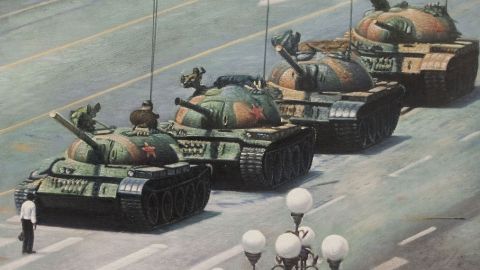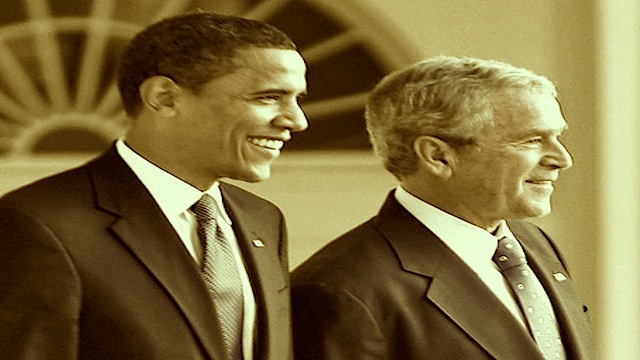Revolutionary Handbook: Why Twitter Can’t Overthrow China

What’s the Big Idea?
Twitter and Facebook have been widely recognized as two key tools in the Revolutionary Handbook of the 21st century. As the story goes, these social media applications have allowed the power of words to defeat the power of tanks and bullets. If only that were true, wrote Malcolm Gladwell in The New Yorker, but in his view, that would still be besides the point. “The least interesting fact” about the revolutions in the Middle East, he wrote, “is that some of the protesters may (or may not) have at one point or another employed some of the tools of the new media to communicate with one another.”
Another problem with this story: in his critique of “cyber-utopianism,” Evgeny Morozov wrote in The Net Delusion that only 0.027 percent of the population of Iran had Twitter accounts at the time of that country’s so-called “Twitter Revolution.” But didn’t Twitter overthrow the government of Egypt? As Frank Rich noted in the The New York Times, on the days of the biggest mass demonstrations in Egypt, the government had actually managed to shut Twitter down, an act of state censorship that was far more sophisticated than whatever demonstrators were able to accomplish in 140 characters.
And yet, this idea still has traction. After all, as Jon Stewart has demonstrated, merely mention the word Twitter and somewhere a CNN anchor seems to be swooning. A more sophisticated analysis of this phenomenon is given by Francis Fukuyama, who after theorizing on the end of history, has recently come out with a book on state formation and the origins of political order.
Fukuyama tells Big Think that political change is driven by anger: “You get angry when you’re slapped by a policeman,” he said. “You get angry when you go to the government and complain about something and nobody listens. In Tunisia this happened to this vegetable seller, Mohamed Bouazizi, who had his cart confiscated by the police and he couldn’t get anyone to explain why they had done this.”
So how does social media play into this anger? Fukuyama argues that first and foremost you need people “to pool that anger because if we’re all isolated individuals, if we’re all sitting and stewing in our isolated apartments, we’re never going to get anywhere.” Fukuyama argues that social media is, in fact, an important tool for organizing people, and communication is the key: “There’s plenty of anger in any authoritarian country against the regime, but unless people cooperate you’re never going to get anywhere.” So the question becomes could it happen in China?
The China Syndrome
Fukuyama told Big Think that regimes fall “when enough people get angry because they’ve had this same experience of being disrespected by their government.” And yet, Fukuyama says a really “smart dictatorship” like that in China realizes the threat of social media to spread discontent and so “they’re always censoring the Internet and they prohibit Facebook and you can’t get to You Tube and that sort of thing. But there’s lots of ways around that because the technology evolves just as fast as the authorities come up with ways to limit technology.”
How much more sophisticated is the Chinese government? In his new book, Fukuyama credits the Chinese with creating an early version of the civil service “a good 1,800 years before anyone in Europe came up with this form of government.” Today, China has grown its institutions into a repressive state apparatus that is far more advanced than the regimes that are being toppled in the Middle East.
To get real political order, Fukuyama says “you need people you’re going to treat in an impersonal way because that’s what a modern state in society is supposed to do.” While the Chinese government may disrespect its citizens, Fukuyama argues, the middle class has chosen stability and material rewards over the promises of participatory democracy.
Deep Background
In understanding how social change occurs, Fukuyama studies in his new book how old social bonds are formed and new ones emerge. One of the factors that led to state formation in China was the evolution of warfare. Early statges of warfare involved the aristocratic classes battling it out in small engagements. This partrician warfare was fought with chariots that were expensive to maintain, and as Fukuyama explains, who may not even kill your enemy on the battlefield because you wanted him to go home and honor his mother.
This all changed during the warring states period, featuring “500 years of relentless warfare” that involved the mobilization of massive armies, conflicts that perhaps dwarfed the numbers of combatants and casualties of the Punic Wars in ancient Rome in which Hannibal was said to have killed nearly 50,000 Romans in a single battle.
While ancient sources vary widely, we know that the sort of mobilization that occurred in the campaigns of the warring states required enormous resources, and taxation to support the armies. Taxation required state institutions to collect taxes, and from that sprung the first states which Fukuyama says broke the tribal bonds of a society that had been based on kinship, in which “everybody believes that they are descended from a common ancestor.”





